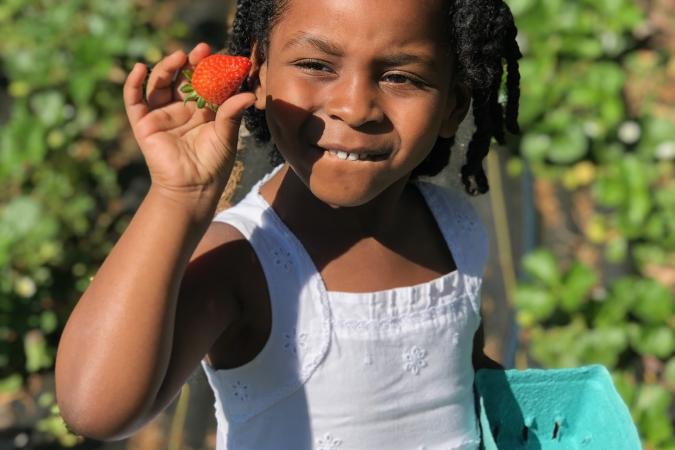
Ecosystem Farm is Georgia's only organic strawberry u-pick. They foster a diverse soil ecosystem without the use of pesticides or synthetic inputs.
Funded on 01/10/2021
Ecosystem Farm grows soil microbes, which allows it to grow healthy, nutrient dense food without the use of pesticides, herbicides, fungicides, or fertilizers. This year they ran Georgia's only organic u-pick strawberry farm. They also lost the land we had tended for three years, and need a loan to purchase and set up our new location in South Atlanta.
Ecosystem Farm's primary use of a business loan will be to build essential infrastructure and plant strawberries for the spring season, as well as to purchase the new property before May 1, 2021. Due to delays funding this through FSA, they are engaging Steward and their community to participate in their lending campaign.
In addition to acquiring land, funds will go towards the following expenses:
Setting up 8 ft perimeter fencing for security, using a deer fencing kit with lighting to secure their one-acre growing space.
Bringing in 3,500 yards of compost and organic material. To maintain their no-spray ethos, they’ll be using compost, mulch hay, and wood chips to ensure plants have the organic material needed to support a soil food web.
Incorporate garlic into the strawberry rows. This is an opportunity to diversify the farm's revenue and hedge against underperforming strawberries. They will be planting organic garlic and purchasing equipment to make black garlic⏤of which they’ll be the only supplier in the area.
Ecosystems Farm believes in a diverse soil ecosystem⏤healthy plants are simply the product of healthy soil. Using a combination of methods from Dr. Elaine Ingham, Jairo Restrepo, and John Kempf, they grow food without pesticides, herbicides, fungicides, or fertilizers. Their only input is organic matter and inoculations of soil organisms if they identify missing pieces of the soil food web. Their strawberries are treated as perennial plants, and will have a low growing perennial understory to ensure no soil is ever left exposed. As the soil develops in this space, the farm plans to incorporate additional annual and perennial fruits to occupy different niches in the plant community, and provide additional income streams to improve the farm’s resilience.
Y'all. I'm floored. With one day to go, we have everything we need to get plants in the ground!!
I don't know if it's possible to hit our original goal, but right now it feels totally possible that we could finish January with a fence, planted field and the deed in our own name! And regardless, we're in amazing shape to open our doors to the public when the strawberries ripen in April. I can't wait to invite every one of you to the farm and show you what your loans have made possible!
Thank you so, so much!
Kirsten
We're going into the last few days of our crowd funded loan. It's been a crazy month... I've definitely had to re-assess some things.
First off, huge thanks to those who have contributed the $11,200 that we've raised thus far - Debra Lubar, Will Pinkston, Sandra Goldi and Sarah Legere!!
Second... $11,200 is a long way from $85,000.
So, what gets cut from the budget?
I'll figure out how to buy the property come spring. That gets us down to $60,000. Next, I'm trying to see if I can get 90 day terms on the compost I was planning to buy, that gets the total to $45,000. Then I'm cutting out what I called the 'shit hits the fan margin' - roughly 10% added to all costs to account for things going wrong. That gets us to roughly $38,000. I can maybe trim some of the organic matter budget, or some of the labor budget, but either starts to risk the viability of the spring crop. Let's say I can trim $4k from each, bringing us to $30,000.
Ok. Now we're over a third of the way to the goal!
Let's be real here for a minute. There's 6 days left in this campaign. I don't expect $20k to appear out of one email to this list of just under a thousand people.
So, like everything else I've done as a farmer, I'll figure it out with what I have. Perhaps y'all can get me to the point where my family might be willing to push this over the finish line. Or perhaps it'll just be less than what I need, and I'll work every daylight hour by myself in January to get plants in the ground and the farm will have to take a couple of steps back in production and I'll pass on taking a salary or having an emergency fund for another couple of years.
Whatever happens, I'll make it work. The more that y'all can loan now, the easier it'll be for me to get up and running. Every penny will be paid back over 5 years, with 8% interest. In investment terms, this is a higher risk; it's a farm, it's a startup, there are limits to what the company can recover for lenders if I default, etc. In personal terms, I'm not defaulting on my community. If I have to get a job to pay this money back, I will.
Get project announcements, farmer introductions, company updates, and more by subscribing to the Steward newsletter. Join our growing community of people who are making regenerative agriculture the foundation of our future.
Join a growing community of sustainably-minded lenders reaping the rewards from responsible farming